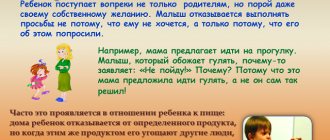Each period of childhood is characterized by deviations from behavioral norms due to the age crisis. However, when such deviations drag on, forming persistent destructive behavior, they speak of a behavioral disorder. Behavioral disorders are a stable pattern of actions characterized by a refusal to maintain the rules characteristic of a certain age, the norms of a given society, and also those that violate the rights of other people.
Such a diagnosis is made very carefully. It is necessary to meet several criteria for behavioral disorganization, lasting at least 6 months. The age of the patient must be taken into account. For example, outbursts of rage are considered the norm for 3-year-old children, but in younger schoolchildren such a sign already makes them wary. Individual, episodic violations of the behavior pattern are not taken into account.
General patterns
Conduct disorder in children and adolescents is characterized by persistent antisocial, aggressive, and defiant behavior. They can manifest themselves only within family relationships or have a total character that extends to the entire environment.
To make a diagnosis, three or more criteria must be met during the previous year at least once in the last six months:
- conflicts with parents, non-compliance with established generally accepted family rules;
- aggressive attitude towards animals and people;
- destructive actions, causing damage, theft;
- deceit, duplicity, meanness.
Behaviors are so destructive that they cause disruption in relationships in the family, school, and other groups.
Behavioral defects are represented by several generalized groups:
- open destructive behavior - fights, robberies, hooliganism;
- hidden destructive - theft, deception, arson, vandalism;
- hidden non-destructive – absenteeism, bad habits, addictions, obscene speech.
Behavioral disorders of childhood and adolescence include hyperactivity, as well as emotional changes that are closely related to behavior.
Behavioral defects are not the usual whims of children or the indiscipline of teenagers. Such deviations are severe, persistent changes that can leave a negative imprint on a person. As a rule, in adulthood, pathological manners are smoothed out, however, illuminating an early age, they can develop into psychopathy.
Behavioral defects are also a manifestation of various mental disorders. Then attention is focused on the underlying disease.
How does a child’s behavior and psychology change at 5 years old?
At the age of 5, individual character traits appear; the child freely expresses his opinion, realizing that his views may differ from those generally accepted. It's interesting to have a conversation with him. Children's observations at this age amaze adults with their originality and depth. The vocabulary is replenished, the child easily selects synonyms and rhymes, retells the plots of books, games, cartoons, and learns poems by heart.
Kids lie more often to check what the consequences will be: it is interesting to check possible scenarios. Children often have numerous imaginary friends - their imagination works in high gear. Long-term memory functions well.
There is an interest in describing feelings and emotions, playing with role models. Preschoolers aged 5-6 years are able to minimally care for themselves - dress, wash, use cutlery.
Causes
There are a sufficient number of factors that provoke the development of the defect. It is impossible to talk about their determining effect, but these provocateurs are capable of preparing favorable soil.
A special role belongs to the family atmosphere in which a small family member is raised. For example, a relationship has been established between conduct disorder and parental divorce, the appearance of a stepparent, a large family, and poverty. Sometimes the mother's age is too young.
A destructive parenting style is considered to be a low level of control and insufficient participation in the life of a child, especially a teenager, as well as the unpredictability of parents’ reactions to their children’s actions.
There is a relationship between a defective way of acting and a low level of intelligence in children, the ability to organize and plan their own activities, and switch attention between goals.
Hereditary factors cannot be ignored. When one family member - parent, brother, sister - suffers from behavioral disorganization, there is a risk that the younger member of the family will adopt similar manners.
Why does a crisis occur at 5 years?
The child’s psyche and cerebral cortex develop daily, and the need for self-expression arises. Whims, unpredictable behavior, emotional outbursts, arguments - this is how personality is formed.
Communication with parents is disrupted, friends disappoint - children are haunted by a feeling of loneliness. Uncontrollability is explained by an attempt to attract the attention of elders, to confirm the significance of one’s opinion.
The child is aware of his biological sex, is interested in the differences between boys and girls, and tries to understand his place in the complex system of human relationships. It is not easy for a child to cope with the flow of incoming information, and he throws out the accumulated tension through stubbornness. Fortunately for parents, this is not forever.
Reactionary foundations of disorganization of actions
There are certain types of reactions characteristic of children with a disorganized manner of action.
For younger children these are:
- protest. Occurs when there is increased imposition of something, or restriction of activity. Active protest is manifested by aggression, rudeness, and damage to property. Passive - hostility, deliberate silence, suicide attempts, starvation, running away from home. Physiological signs – enuresis, digestive disorders, hacking cough;
- refusal is a reaction to dissatisfaction with the sense of security and communication in very young children. Manifestations: lack of activity, desire to communicate, lack of emotion. No response. There is no desire for gaming activities. Everything is not interesting, they are not able to enjoy sweets or favorite toys;
- imitation - imitating the negative traits of authority figures. Children adopt bad habits and antisocial activities;
- compensation - the child compensates for the failures of one activity with the achievements of another. Failures in educational activities are compensated by hooliganism and theft. Fears and timidity are replaced by bullying other children, extreme car and motorcycle riding.
Reactions in teenagers:
- emancipation - resistance to the rules established by adults, rejection of help, disregard for advice and tips;
- grouping - the creation of antisocial groups;
- hobbies - aimed at satisfying interest in a specific activity. Excitement is satisfied by card or other games for money, leadership - by situations of leadership (gangster group). But even if hobbies are positive (sports, art, beauty), they can also destroy acceptable rules of action. They are provoked by refusal to attend school, carrying out illegal acts, making inappropriate acquaintances, ignoring relatives, and committing life-threatening acts.
Pros of the 5 year crisis
Any crisis brings not only challenges, but also new opportunities. At 5-6 years old, children reach the peak of learning and receptivity to new information, gradually learning to read, write and count. To take your mind off psychological problems, try helping your child find a favorite activity.
During the crisis of the age of five, a sea of energy appears. This fact cannot be ignored. You get an invaluable opportunity to direct the child’s strength in a peaceful direction: find a hobby, prepare for school, discover a new talent, improve health.
Physical activity will be useful - sports, team games, long walks. If your baby is growing up calm and reserved, it’s time to unleash his creative potential with the help of educational clubs.
Least severe types of behavioral disorders
One of the weaker malignant forms of disorganization of activity is behavioral disorder limited to the family. It is determined by the aggressive, rude, cruel actions of the patient exclusively in a family environment with respect to relatives or one of the household members. Outside the family, children behave in their usual way. Outsiders are unaware of the problem.
The pathological activities of a child are varied: damage to things, clothes, furniture, theft, aggression, use of physical force. Often inappropriate actions are directed at one of the family members.
The reason for such changes is the departure of one of the parents, the appearance of a stepfather or stepmother. Moreover, aggression is not necessarily directed specifically at the culprit - any family member can suffer.
Pathological acts can take on an extreme degree of development. It happens that children organize arson and other global damage to property.
Often this type of defect provokes the birth of the youngest, next child. Jealousy directs aggression against the new baby, then the offender breaks the “rival’s” toys, may hit, does not want to share, and is even capable of taking regressive forms of action: stop going to the potty, consuming the younger one’s food.
Children are also capable of directing aggression towards their parents, becoming angry, refusing to communicate, and engaging in opposition.
Oppositional defiant disorder is the mildest form of the disorder. Occurs among children under 10 years of age. Characterized by provocative, defiant, hostile forms of action, disobedience, rebellion. However, there is no aggression, cruelty, or antisocial acts that violate the law.
Patients are irritated, easily offended, and lose self-control. Characterized by a high level of frustration. They tend to blame other people for their own failures and mistakes. They ignore comments and requests from adults. Capable of deliberately annoying, doing out of spite. They are rude and often become provocateurs of quarrels.
Changes after the crisis
After a sharp leap in mental development, the child becomes more balanced, listens to the advice of his parents and enjoys spending time with his family.
Strong-willed qualities of character and self-control are strengthened. The kid organizes the daily routine, sets priorities (do homework first, then rest; go to bed on time).
Character traits, tastes and preferences are clearly visible. The child judges events almost without regard to parents or friends.
Unsocialized/socialized behavior disorder
Unsocialized behavior disorder is accompanied by aggression and antisocial acts directed at other children. This is the main distinguishing feature of the defect.
It is expressed by the inability to establish relationships with peers, rejection by children, and lack of close friends.
Relationships with adults are maintained or also disrupted. The child is rude and angry. He is an individualist who opposes authority. Typically:
- hooliganism;
- physical, mental violence, pugnacity;
- cruelty towards children and animals;
- damage to property.
Petya, 7 years old. Having entered the 1st grade, problems emerged in interacting with classmates. He was rude and confrontational. He did not establish friendly relations with anyone. I started about 15 quarrels a day. Overly cruel. During fights he inflicted serious injuries. Indifferent to other people's pain.
Violated discipline. He reacted to comments with verbal aggression. He was restless and talked in class. Uncontrollable, opposed to the regime. He called teachers villains. However, he showed high intellectual abilities and curiosity.
He was expelled from school for bad behavior. Refuses to study at home. He is interested in computer games and plays with a toy telephone. Fussy, hyperactive. Calms down when he finds something exciting to do. He loves to listen when his mother reads a book to him. He categorically does not want to return to school.
Socialized behavior disorder: characterized by aggressive, antisocial behavior of sociable adolescents who have long-term, established relationships with peers. They often become members of antisocial groups.
Illegal acts are typical: robbery, theft, assault.
Relationships with adults in power (teachers, parents) are disrupted, but with others they are able to maintain normal relationships.
Veronica, 13 years old, 7th grade student. Doesn't attend school. Absent from home for weeks. She is rude, aggressive, and confrontational with relatives.
Sloppy. He smokes, drinks, wears bright makeup. Takes up to 10 tablets of diphenhydramine to “catch glitches.” One day, my friend and I took pills, trying to commit suicide. Having experienced painful consequences, they did not repeat the attempt. They offered to try heroin, but she refused, fearing the outcome.
Takes money out of the house. One day I stole money from my mother at work. He is friends with older guys. Together they robbed my sister’s room, taking out money and jewelry, after a conflict with my sister’s husband.
The girl stopped attending the school her parents had recently transferred to when her classmates started calling her names. Then she set her older comrades against the offenders to intimidate them. Afterwards, Veronica visited the school to see if she would be teased further. Satisfied that there was no bullying, she never returned to school.
He mocks his younger brother and offends him. The girl's behavior changed after the death of her father and the birth of a brother from her mother's second marriage.
Consultation for parents “Children’s negativism”
Lyubov Yashkina
Consultation for parents “Children’s negativism”
Darling of the family
How to find a cure for permissiveness?
You yourself haven’t noticed how any “I want”
your child turned into an order?
Refusal to buy the twenty-fifth doll or replace lunch with candy results in a half-hour hysteria, and in the end you give up?
It's time to sound the alarm: your heir is showing obvious signs of being spoiled! And, paradoxically, the “disease”
provoked by boundless
parental love .
In fact, psychologists warn, education without “frameworks”
infects the child with the virus of permissiveness and turns him into a domestic tyrant.
Ultimately, the darling himself will begin to suffer from this, because outside the family the little egoist will not meet the worship that he is used to seeing from his household.
On the contrary, egocentrism makes a spoiled child an outcast among his peers. How can we restore the balance between the need to love and the need to educate?
Experts advise drawing a line between indulging momentary whims and caring.
Tears are not a reason to panic.
Often, parents . Well, how can you find the strength to say “no to the most beloved creature in the world?”
In this case, parents perceive refusal as stress for the child. But is this really so?
The children's psyche is quite excitable, but there is nothing unnatural about it. Tears are an expression of emotions inherent in age that the baby has not yet learned to restrain. Helping the baby develop the correct reaction to the world around him and figure out what is good and what is bad is the task of parents . To do this, they themselves need to learn to respond adequately to children's crying .
Experienced teachers say: in the matter of education, endurance is most important. That is, just ignore the loud roar. After all, your baby won’t cry forever! Sooner or later he will understand that tears and screaming will not achieve anything from you. Otherwise, the child will use hysterics as a form of manipulation of household members, and the disease of disobedience will enter a chronic stage.
And one more important point! If you once told your child a firm “no”
(for example, in response to a demand to watch a cartoon instead of a nap, do not cancel your decision under any circumstances (and do not allow someone close to you to do this! Otherwise, the child will never take your words seriously: just think - mom forbade! I I’ll shout and dad will allow it! This should under no circumstances be allowed.
Remember: in the family the main ones are the parents and their word is the law . And the child must learn this too.
Seven nannies have a child without brakes.
Alas, not every young family can afford their parents
However, even if you have your own living space, it is not so easy to get rid of the influence of grandparents.
On the one hand, there is no doubt that it is wonderful when a mother, who is still learning the basics of pedagogy, has experienced advisers.
On the other hand, the inconsistency of the educational positions of two generations is fraught with the collapse of any attempt to instill in a child the concept of certain measures of behavior.
For a month you have been struggling with your child’s demand to enjoy dessert before soup, and the compassionate grandmother, having treated the “hungry child”
a chocolate before lunch will ruin your efforts.
Feeling the protection of older family members, the baby will quickly figure out who to look for protection from the “bad” ones.
mom and dad.
Of course, discussing educational methods with all-knowing grandparents is not a pleasant experience. However, parents need to be firm.
Ultimately, it is you who are responsible for your heir.
To prevent a “swan, crayfish and pike”
, it wouldn’t hurt for all educators to gather at a round table and discuss pedagogical strategy and tactics. Only by reaching an agreement among themselves can adults find a common language with the child.
Authority is more effective than dictate.
Some parents , allowing their child any whim, refer to the Japanese experience, where the word “impossible”
It is practically not used for educational purposes.
However, not everyone interprets the nuances of this “permissive”
tactic correctly.
In the Land of the Rising Sun, sharp turns of speech in communication with a child and physical punishment of naughty girls are truly taboo. However, this does not mean the absence of any upbringing. The Japanese regulate the child's behavior by influencing his sensory perception of the surrounding reality. From the lips of his mother, grandmother, sister, the baby hears not prohibitions, but warnings: dangerous, dirty, painful, etc.
The essence of the Japanese method of education is not to mechanically put barriers in the way of children’s knowledge of the outside world, but to clearly explain the consequences of unwanted actions.
The personal example of family and friends is of particular importance in the Japanese value system.
Looking at the mother and imitating her, the baby learns to behave with dignity. "From a young age"
The Japanese are taught: it’s a shame to be bad.
As a result, the child avoids bad deeds not out of fear of punishment, but out of fear of “losing face.”
.
The main result of “education the Japanese way”
: children who grow up in greenhouse conditions, from our point of view, do not turn into spoiled monsters, but grow up to be collected and disciplined people.
And one more conclusion: the Japanese see the successors of the family as individuals. And we often try to “carve out”
heirs using a stencil, turning your daughter or son into your own showcase.
Expensive clothes, a specialized school, a prestigious sport are standard attributes of success that parents try to surround their children with.
But let's not forget that love and attention, which our children need much more urgently, have no material equivalent.
Three-year crisis: favorite word is “no”
!
How to deal with childhood negativism
Our son will turn 4 years old in a month. Vanya is a real ball of stubbornness and contradictions. For example, he says: “There will be no New Year”
.I answer him:
“Why it will be!”
And it begins: “It won’t, it won’t,” and so on twenty times with tears and screams.
Moreover, our grandmother, unable to withstand her grandson’s hysterics, “gives up”
:
“Okay, it won’t happen, it won’t happen
.
We, parents , cannot and do not want to agree that white is black.
In general, over the last year Vanya has become very stubborn. He does not recognize any authorities. In kindergarten, the teachers complain that he doesn’t want to do anything: he doesn’t want to sculpt - he doesn’t sculpt, he’s not in the mood to draw - he doesn’t draw, doesn’t dress himself - and they often don’t take him for a walk. I’m terrified: what should I do? The age of the child and the description of his behavior suggest that this is a manifestation of the “three-year crisis”
(of course, this is a conditional name: like all age-related crises, its timing may vary depending on the individual characteristics of the person).
The so-called “ negativism ”
, which the child has now entered - this is one of the stages of FORMATION OF HIS PERSONALITY. At this stage of development, it seems to the child that denying every word of an adult is a manifestation of independence. Judge for yourself: mom and dad always decide everything for the little man, but one day the moment comes when he really wants to express his own opinion. And the simplest and most obvious way to do this is to start denying everything that adults impose.
We cannot and do not want to agree that white is black. In fact, your child knows perfectly well that white is white, but now he needs to defend the right to his opinion, even if it is erroneous.
You waste time repeating “yes, yes, yes” a hundred times.
in response to his
“no, no, no.”
, as if the actual course of events depends on the child’s words.
The impression is that parents, just like their sons, care not about reality, but about the statement of their OWN opinion.
This means that the child imposed his own form of behavior on you and began to control you. Without knowing it, you have entered into a meaningless game called “Who will outmaneuver whom?”
.
However, not only you, but also the majority of parents , faced with the first manifestation of their own “I”
, fall into a stupor and do not know what to do about it. And the way out of the situation is quite simple: you need to PLAY!
Make the word "no"
entertainment - so it will lose its danger.
For example, ask your son: “Do you want to go for a walk?”
and, without allowing him to answer, immediately grimace a little yourself, making a funny face:
“No, no, no!”
.
The baby will laugh, and the word “no”
from
a “formidable weapon”
into fun.
Or, for example, play the game “Everything is the other way around”
: With a serious look, explain to your child that he doesn’t want cutlets at all, the New Year will not come, and the grass is not green at all. The stubborn little guy will immediately try to convince you otherwise!
But there is one thing: in really important issues concerning the safety of the baby, you need to be firm.
And finally, the most important thing. You must understand: just as an athlete trains before important competitions, so a person must train to become a person. And if you treat your child’s first crisis of self-awareness with prudence and a dose of humor, then you will never find yourself on opposite sides of the “barricades”
, erected by his maturing consciousness.
Hyperkinetic disorder
Develops at an early age. Determined by excessive activity, difficulty concentrating, especially regarding intellectual tasks. The children's activities are poorly organized: they grab onto a new task without finishing the previous one.
Restless, restless, easily distracted by extraneous stimuli. Therefore, it is difficult for a hyperactive student to sit in school classes. He is lost in his own dreams and is inattentive. Learning problems make it difficult to learn new knowledge, causing delayed cognitive development.
Impulsivity is manifested by thoughtless, unexpected actions, sometimes of a dangerous nature. Children run out onto the roadway, climb onto roofs, and play with flammable objects. Impulsivity is also expressed in tactless, inappropriate language. The mood changes quickly. Patients are quick-tempered and unbalanced.
Subsequently, such children, rejected by their environment, become aggressive, express protest, and are involved in illegal acts.
What should you not do?
- Unfortunately, parents sometimes lose patience and raise their voices at their children. This is useless: talk calmly, softly, but persistently. Give logical arguments.
- Physical violence is unacceptable. Eliminate even spanking and other “harmless” touching.
- Don't take your anger out on your child. Are you feeling tired? Find another way to get rid of negativity.
- Don't punish with indifference. If you see that your child has said something rude, but cannot cope with the problem without you, come and help him. Responsibility always lies with the adult.
- Don't leave in trouble. The child must be sure that his parents are always ready to help - this is the basis of psychological comfort.
- Don't scold for no reason. Express dissatisfaction correctly, be sure to emphasize why this or that action upset you.
- Don't focus on children's lies. Offer to imagine together, write a story or draw a picture with fictional characters.
- Avoid suffocating guardianship. Give your child a chance to develop freely, without pressure and external control. Show that you already trust him in many matters.
- Don’t brush it off with the words “You’re doing your nonsense again.” Find time to listen, sympathize, give advice.
- Don't worry too much. Every family goes through crises when their children grow up. When the unpleasant period is over, you will appreciate the fruits of patience and proper upbringing.
Emotional Intelligence for Children
We introduce children to the types of emotions, how to manage them and how to express themselves in teamwork, through situational games,
find out more
Depressive disorder
Certain age periods are distinguished by their own depressive disorders.
Young children, up to 3 years old, become sad and avoid eye contact. There is a delay in the acquisition of new skills and achievements according to the age period. Self-harming behavior is typical: biting, hitting oneself, hitting one's head. Calming movements include thumb sucking, rocking, and monotonous walking.
Younger schoolchildren become apathetic, irritable, and withdrawn. There is a loss of interests and a decrease in intellectual activity. Sleep is disturbed.
Adolescent depression is determined by negativism and rapid mood swings. Disturbing feelings of guilt, self-accusation. Sleep and eating disorders are typical. Negativism and aggressiveness provoke deterioration in relationships with friends and problems in educational activities. Suicide attempts are a common symptom.
Signs of the beginning of a crisis
How to understand that a crisis has arrived? It arises due to an internal conflict: the child discovers that desires and real possibilities do not coincide, and it is not possible to achieve complete autonomy - the parents control every step.
- Unreasonable aggression. The kid is rude, snaps, refuses to follow requests. Pushes away relatives whom he used to love very much.
- Hysterics. Minor failures bring tears: I couldn’t find my favorite car, I was forbidden to go outside.
- The child imitates his elders, imitates them, tries to be an “adult.” Grimaces, adopts habits.
- A need for solitude arises: children as young as five years old love to lock themselves in a room and create secret corners. They refuse to share information (they don’t tell how their day went, what they discussed with friends). This is explained by the desire to solve problems individually.
- Phobias, nightmares, restless sleep. The child is afraid of supernatural beings and refuses to sleep in a room alone. Existential fears are also added - obsessive thoughts about painful illnesses, death, a sad future (“What if I don’t have friends? But won’t I get sick?”)
- Diffidence. The child competes with peers, compares himself with others. Asks to evaluate his appearance or actions (“Do I have a nice dress?”)
Destruction of sexual behavior
Teenagers easily succumb to sexual destruction, given the incompleteness of their sexual identification and the unconscious increase in sexual desire. Typically, adolescent sexual perversions are determined by accelerated or delayed puberty.
Often children with delayed sexual development become victims of sexual perversion. They are unsure of themselves, slow, clumsy, uncollected.
Adolescents with accelerated sexual development are hot-tempered, aggressive, cruel and have sadistic tendencies. Suffer from sexual desire disorders. Most often noted:
- visionism - hidden looking at naked people;
- exhibitionism - nudity in public;
- seduction of children;
- sexual manipulation of animals;
- group masturbation;
- erotic fantasies, reasoning with masturbation;
- sexual attraction to urine, feces.
Sexual deviations are considered to be sexual contact, petting - mutual caresses without sexual relations, occurring before puberty, promiscuity in adolescence - numerous sexual relations with different partners.
Sexual perversions are expressed by teenage homosexuality, which is situational in nature. Possible in closed single-sex educational institutions.
In adulthood, with adequate sexual life, sexual perversions disappear. Otherwise, they last a lifetime.
Advice from Dr. Komarovsky
What does pediatrician E. O. Komarovsky recommend doing with uncontrollable children?
- React to hysterics calmly, with a smile, ignore if necessary. The child makes scandals in front of people who are sensitive to him. If you feel like you're ready to break down, go somewhere else. Family members must adhere to one line of behavior: the pattern “mom scolds, dad does nothing, grandma allows everything” will lead to spoiling.
- Don't follow the lead of others. Do people look at you with judgment because you don't let your child take a second candy bar from the store shelf? Wait until the hysteria stops without your intervention. If you give in, the child will begin to use this technique for manipulation, acting up in front of strangers. A minute of silent condemnation is better than hours of children's screams.
- It is necessary to master pedagogical subtleties not during a crisis, but much earlier. Is the child still crawling, just getting ready to take his first steps? Read about the upcoming crises of 3 and 5 years. Prepare for tests in advance.
- If tantrums occur for no reason, and the child is rarely in a calm state, consult a doctor.
- Adults may lose self-control: spanking, punishing, screaming. For repeated nervous breakdowns, parents should seek help from a family psychologist. Children are sensitive to the state of their elders; this behavior traumatizes them. The consequences will appear when the child grows up.
- There should be a cause-and-effect relationship in the actions: if you dropped a cookie, you’ll take a second one from the pack tomorrow. If you refuse the food offered, you will get it later. There is no need to instantly correct children’s mistakes, pick up objects from the floor, or force-feed them. Form responsibility for your actions from an early age.
- The important thing is the relationship between actions and time. “You misbehave in the morning, you’ll be left without cartoons in the evening!”, “If you cry, you won’t go to your birthday party this weekend!” - it is not right. By the end of the day, the child will have forgotten what happened. Report consequences immediately.
- Children are entirely dependent on your will. Don't compete with them. You do not have the right to ignore biological needs by limiting healthy food, walks, sleep, but as punishment you can prohibit “excesses”: sweets, buying toys.










